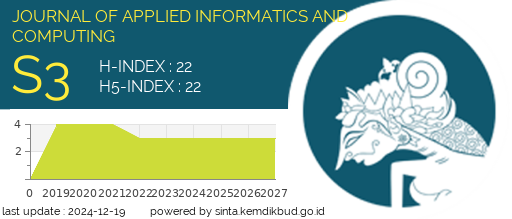Implementation of Apriori Algorithm for Determining Spare Parts Product Recommendation Packages
DOI:
https://doi.org/10.30871/jaic.v7i2.5589Keywords:
Spare Parts Product, Apriori Algorithm, Crisp-DM, Association RulesAbstract
The aim of this research is to determine recommended product packages for spare parts from an automotive parts supplier. Shop owners have faced challenges in meeting customer demands over the past few months, experiencing frequent stockouts of spare parts due to a manual transaction recording system and a manual checking system for spare parts storage. This inefficiency and lack of accuracy in managing in-demand spare parts prompted the application of the apriori algorithm, a data mining method. Data was collected from the total sales over the past three months, subsequently cleaned and transformed for manual and Python-based apriori calculations. The results, obtained through both manual and Python implementations of apriori, indicate that the two frequently occurring item sets are oil filters with a confidence value of 68% and air filters with a confidence value of 63%. Based on these findings, the study recommends spare parts stores to maintain higher stock levels of oil filters and air filters compared to other spare parts.
Downloads
References
G. A. Pradnyana Dan K. Agustini, Konsep Dasar Data Mining, Vol. 1. 2022.
Z. Abidin, A. Kharisma Amartya, Dan A. Nurdin, "Penerapan Algoritma Apriori Pada Penjualan Suku Cadang Kendaraan Roda Dua (Studi Kasus: Toko Prima Motor Sidomulyo)," Jurnal Teknoinfo, Vol. 16, No. 2, Hlm. 225"“232, 2022.
P. Haryandi, Y. Widiastiwi, Dan N. Chamidah, "Penerapan Algoritma Apriori Untuk Mencari Pola Penjualan Produk Herbal (Studi Kasus: Toko Hanawan Gemilang)," Jurnal Informatik, Vol. 17, No. 3, Hlm. 218"“225, 2021.
S. A. FADHILAH, "Analisis Perilaku Pembelian Konsumen Menggunakan Metode Association Rule-Market Basket Analysis Dan Clustering Analysis (Studi Kasus: Jore Coffee & Eatery)," 2022, Accessed: Nov. 29, 2023. [Online]. Available: https://dspace.uii.ac.id/handle/123456789/42734
Y. Rokhayati, U. H. B. Rusdi, D. E. Kurniawan, N. Z. Janah, and S. Irawan, "Analysis of SP Students Using AHP-Apriori Combination," in Proceedings of the International Conference On Applied Science and Technology 2019 - Social Sciences Track (iCASTSS 2019), Nusa Dua, Indonesia: Atlantis Press, 2019. doi: 10.2991/icastss-19.2019.40.
A. M. B. Butar, "Penerapan Algoritma Apriori Pada Pengolahan Data Mining Untuk Mengetahui Pola Pembelian Konsumen Pd. Lucky Metal Part," PhD Thesis, KODEUNIVERSITAS041060# UniversitasBuddhiDharma, 2022. Accessed: Nov. 29, 2023. [Online]. Available: http://repositori.buddhidharma.ac.id/id/eprint/1484
D. E. Kurniawan and A. Fatulloh, "Clustering of Social Conditions in Batam, Indonesia Using K-Means Algorithm and Geographic Information System," 2017
S. Rahmayuni, "Penerapan Algoritma Apriori Pada Data Perceraian Untuk Mengetahui Faktor-Faktor", Accessed: Nov. 29, 2023. [Online]. Available: https://www.academia.edu/download/89896260/300878716.pdf
A. Renalda, A. Susilo, Y. Irawan, Dan A. Suharso, "Analisi Data Transaksi Penjualan Menggunakan Algoritma Apriori Untuk Menentukan Paket Promosi Refarasi Mobil," Jurnal Sains Komputer & Informatika (J-Sakti), Vol. 5, No. 2, Hlm. 925"“934, 2021.
A. Hamdani Dan C. Rozikin, "Analisis Data Transaksi Penjualan Menggunakan Algoritma Apriori Untuk Menentukan Paket Variasi Mobil (Studi Kasus: Bengkel Mobil Victory)," Jurnal Pendidikan Dan Konseling, Vol. 4, No. 4, Hlm. 4865"“4871, 2022.
N. Devita Sari Dan S. Khoiriah, "Penerapan Metode Asosiasi Pada Toko Afifa Dengan Algoritma Apriori," Teknologi Informasi & Komputer, Vol. 1, No. 1, Hlm. 8"“17, 2022.
D. A. Istiqomah, Y. Astuti, Dan S. Nurjanah, "Implementasi Algoritma Fp-Growth Dan Apriori Untuk Persediaan Produk," Jip (Jurnal Informatika Polinema), Vol. 8, No. 2, Hlm. 37"“42, 2022.
Styawati Dan K. N. Anjumi, "Analisis Pola Transaksi Pelanggan menggunakan Algoritme apriori," Jurnal Sains Komputer & Informatika (J-Sakti) , Vol. 5, No. 2, Hlm. 619"“626, 2021.
F. Mahmuda, M. A. R. Sitorus, H. Widyastuti, and D. E. Kurniawan, "Clustering Profil Pengunjung Perpustakaan Menggunakan Algoritma K-Means," Journal of Applied Informatics and Computing, vol. 1, no. 1, Art. no. 1, 2017, doi: 10.30871/jaic.v1i1.476.
T. Evendi Dan R. F. A. Aziza, "Penerapan Algoritma Apriori Untuk Menemukan Hubungan Antara Jenis Komoditas Import Dengan Jumlah Permintaanbulanan," Jurnal Teknokompak, Vol. 13, No. 1, Hlm. 18"“23, 2019.
Downloads
Published
How to Cite
Issue
Section
License
Copyright (c) 2023 Yumaris Alfi Alhillah, Wowon Priatna, Aida Fitriyani

This work is licensed under a Creative Commons Attribution-ShareAlike 4.0 International License.
Authors who publish with this journal agree to the following terms:
- Authors retain copyright and grant the journal right of first publication with the work simultaneously licensed under a Creative Commons Attribution License (Attribution-ShareAlike 4.0 International (CC BY-SA 4.0) ) that allows others to share the work with an acknowledgement of the work's authorship and initial publication in this journal.
- Authors are able to enter into separate, additional contractual arrangements for the non-exclusive distribution of the journal's published version of the work (e.g., post it to an institutional repository or publish it in a book), with an acknowledgement of its initial publication in this journal.
- Authors are permitted and encouraged to post their work online (e.g., in institutional repositories or on their website) prior to and during the submission process, as it can lead to productive exchanges, as well as earlier and greater citation of published work (See The Effect of Open Access).











